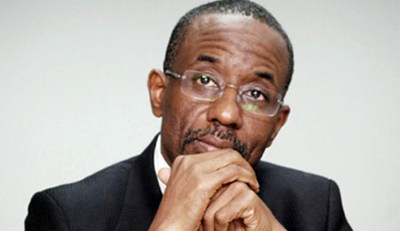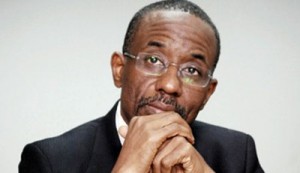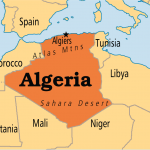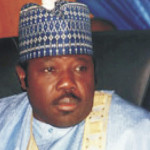Why Sanusi Must Be Probed, By Buruji Kashamu
Articles/Opinion, Latest Headlines, News Saturday, March 1st, 2014
AN OPEN LETTER TO MR. PRESIDENT, AGF, SENATE, HOUSE OF REPS, EFCC, ICPC, SSS, POLICE, SGF, COS
INTRODUCTION
Expectedly, since the suspension from office of Mallam Sanusi Lamido Sanusi as Governor of the Central Bank of Nigeria (CBN), a lot of reactions have greeted the action – some in support of the step taken by the Federal Government, others against it. But there is a trend that I have found worrisome in the whole scenario, hence my intervention. I am worried by the attempt by the opposition to make it look as if they own Sanusi more than the government that appointed him, and thereby politicise the whole issue. From the comments of the opposition and some of its leading lights, especially those he favoured with questionable waivers and contracts, it is obvious that while he was appointed by the PDP-led Federal Government, Sanusi was acting their script. Now that he has been told to step aside for proper investigation into the allegations against him, all hell is let loose as if some people want him to sit in judgment over his own case. Is it not said that he who comes to equity must come with clean hands?
To be sure, Lamido burst into our consciousness on the 14th of August 2008 when he announced the removal (with immediate effect just like in the military days) of five Bank CEOs and the placing of the bank under Central Bank of Nigeria (CBN) management.
Soon after, another set of four banks were also ambushed after a sham inspection of all the Banks by a team comprising Nigeria Deposit Insurance Corporation – NDIC – and Central Bank of Nigeria – CBN- officials.
The antecedents of the abovementioned matter are now well chronicled in various public records, including news-media reports and there is no need to repeat each and every separate incident comprising the overarching and disruptive measures the CBN has effectively unleashed upon the Nigerian economy in general since the 14th of August 2009.
In summary, the CBN Governor, based on secret reports, declared selected banks in “grave situation”, removed the management and some non-executive Directors of those banks, infused billions of public funds into those banks and proceeded to nationalise some of them and sold the others to mainly inscrutable consortia.
The Farida Waziri-led Economic and Financial Crimes Commission (EFCC) was conscripted with a mandate to arraign some of the officers of the banks before the criminal courts on various allegations of misconduct and harass some of the customers of the banks into making, in many cases unscheduled repayments of funds, loaned for important commercial projects, back to the banks now managed by Lamido Sanusi Lamido appointed management.
It is clear that many who had been cowed or blackmailed into silence will find the suspension of the CBN Governor reassuring of their belief that the Nigerian judicial system will deliver justice.
However, there are still issues which the courts alone cannot resolve and may be summarised as follows:
A. Was there an agenda being pursued by the CBN Governor in the selection of the affected banks vitiating the claims of the CBN to “good faith” or “acting in the interest of the country and its economy”?
B. Did the CBN act within the parameters of the relevant laws, the constitution and known norms of natural justice, fair play, the rule of law and due process?
C. What is the real source of the funds he injected into the banks and why were these funds sourced in advance of the measures giving further credence to the allegations of premeditation?
D. Have the measures taken and the manner in which they were taken not further damaged the economy of the country and weakened its resistance to any vagaries in respect of the international economy.
E. Was the arraignment of a few officers of a few banks in regard to allegations which have been made against virtually all the managers of all the banks including those given a clean bill of health not merely “scapegoatism” which has further imperilled the potential for reform in the sector?
F. Did the superficial measures taken by Sanusi Lamido really address fundamental systemic problems or merely accentuate the problem of autocracy and inconsistency, which is one of the major banes of the Nigerian economy in particular and the polity in general.
G. Will the attack on the entrepreneurial spirit of the emerging Nigerian business class through the indiscriminate attack on their integrity and patriotism not make rent seeking a more attractive means of wealth creation just as the destruction of the manufacturing industry did in the past?
Some of these issues may be debated in the courts in the course of various litigations, including even the former CEOs of the banks.
However, I believe that most of these issues are outside the purview of the technical, adversarial procedure and vulnerabilities of the judicial process and require a more holistic approach and resolution, which the National Assembly is well equipped to facilitate. Perhaps appropriate banking law; business and regulatory reform legislation may yet emerge from the National Assembly.
The charges filed against some of the bank chiefs and the allegations constantly being bandied in the media for the most part amount to no more than a hindsight criminalisation of actions taken in the heat and dust of commercial competition which the banks were constrained to undertake in order to maintain profitability and ensure their ability to pay returns to their depositors and shareholders. The attempt to stigmatise these patently legal activities caused incalculable damage to economy.
I believe that because of the deftly manipulated media, the CBN Governor was painted as a hero and the bankers as devils as only one side of the story as told by CBN and EFCC dominated the media.
The other side of the story may be summarised as follows:
1. ALLEGED ROT IN THE BANKING SECTOR, NON-PERFORMING LOANS ET AL
Walter Bagehot in 1873 said that “in wild periods of alarm, one failure makes many and the best way to prevent the derivative failures is to arrest the primary failure which causes them”
It has been generally agreed worldwide that the current global financial crisis whether in its primary or subsidiary eruptions was largely caused by inefficient and/or inexistent regulation. The rot started with the regulatory authorities.
If there is rot in the Nigerian Banking sector, it cannot be stopped by an attempt to cure the symptoms. The actions of the Central Bank of Nigeria in that regard miss the target. It ought to have started with the CBN itself to find out why some of the things alleged to have been wrongly done by the Banks were allowed or overlooked by the regulator.
Whereas, in other climes there seems to be an attempt to consolidate regulatory functions for the financial system in one body, it appears that Nigeria’s peculiar situation calls for a separation of the supervision and regulation of the financial system from the core functions of the Central Bank. Once banking supervision is removed from the CBN then that function may then be consolidated with regulation of all other financial services, including investment and insurance services under a new regulator.
The current autocratic posture of the Central Bank, which in our submission has raised issues of abuse of power and the credibility of the current measures, makes this more necessary.
The reasons cited by the CBN for the removal of the management of these banks include liquidity ratios falling between 19% and 24% and therefore below the regulatory minimum of 25%; capital adequacy ratios below statutory minimum of 10%; and poor corporate governance. These reasons, if at all established, are at best infractions for which the relevant laws have prescribed sanctions and procedures, and none includes removal of management without a fair hearing.
The unsigned reports recently released by the CBN for the prosecution of our clients through the EFCC, which it represents to be the reports of its special examination of the five banks, clearly show that the CBN had no basis for the current actions taken against the management and the banks since none of the reports recommended any of the actions so far taken. For example, in the case of Oceanic Bank, the recommendation was that the Board of the Bank be requested to capitalise the bank by an additional N55 billion. No recommendation for removal of management or prosecution for any infraction was made. One cannot help but wonder, for instance, on what information or criteria the CBN decided to inject N120 Billion into Oceanic Bank.
It is pertinent to mention here that the CBN handling of the results and implementation of the recommendations of the second batch of examination reports for the 11 banks shows clearly that there is a need to revisit the way the first 10 banks were handled. The detention, harassment, embarrassment and lack of fair hearing experienced by the first five (5) banks are unjust and should be redressed.
The basis on which affected banks were singled out for examination and restructuring is at best tenuous as it is clear that any of the 24 licensed banks could have qualified for this same treatment.
Taking advantage of interbank borrowing is not evidence of distress as suggested by the Central Bank nor is Central Bank Guarantee of Interbank deposits a sign of distress. The figures, which are available, show that the banks were far from being distressed with an asset base far in excess of total exposure and a track record of profitability that belies the allegation that the banks were being run in a manner detrimental to the interests of shareholders or depositors.
The new management appointed by the CBN have not been able to make the Banks work any better than under the removed management in spite of the infusion of public funds and it appears only a matter of time before the real distress starts.
2. THE COMPLICITY OF CRITICAL STAKEHOLDERS IN THE ALLEGED ROT AND DECAY IN THE BANKING SECTOR:
Apart from the inexorable effects of the global economic meltdown on the Nigerian economy, the support of the banks for government economic policies, programmes and inconsistent /inconsiderate fiscal measures accounted for much of the riskier assets now declared “no-performing” by the CBN.
Examples include the following:
A. SUPPORT FOR THE DOMESTIC ECONOMY AND POLITICAL STABILITY:
The Banks are being punished because of their heavy support for the importation of petroleum products, which are an essential commodity, and without such support could, have become scarce and result in political upheaval. To ensure that the country has uninterrupted supply of petroleum products, banks financed importers of petroleum products. These importers are licensed and duly approved by the Petroleum Products Pricing and Regulatory Agency (PPPRA), an agency of the government, which issues importers with import quotas based on which it pays subsidies on imports of Kerosene and Petrol.
Currently, in spite of denials, no private importer is importing petroleum products and not because NNPC has the wherewithal to satisfy local demand but because the banks are no longer supporting that business. The move by government to remove subsidies in reaction threatens to unleash pent up anger of the masses against the government.
B. PRECIPITATE DEVALUATION:
The CBN is fully advised of all foreign lines accessed by the Banks and at no time did CBN advise against these lines. The lines are used to service the domestic economy and are used to finance critical imports like petroleum products. Whilst these positions were open, the CBN, without warning, devalued the currency by N30 to the US Dollar; without consideration for the loss implications of the open lines. The losses to the banking industry in this regard run into tens of Billions.
Currently, the CBN and its officials have been trying to persuade foreign banks to reopen the lines to no avail.
C. BALANCE SHEET CONTRACTION:
As a result of global meltdown, foreign banks withdrew the foreign lines leading to a funding contraction. Such a funding contraction is obviously not due to mismanagement. This ought to have been predictable and support given to the banks to ensure it did not sharply affect their liquidity. This is the kind of show of strength that would have given confidence to foreign banks to resume the lines given as soon as they were in a position to do so and there would have been no need for the damage control going on now.
D. GUARANTEE OF INTERBANK DEPOSITS:
The CBN Governor said he took the actions leading to the takeover of the banks because the CBN had to guarantee Interbank Deposits and he read that as a sign that the system was under threat. On the contrary, a robust interbank system with free flow of fund between banks with shortfall and those with surplus is a crucial part of a healthy banking system. In times of disruption, like those that happened in the situations set out above, this market dries up because banks are unable to measure risk. Part of the role of the CBN in such times is to aid market rejuvenation. This is what guaranteeing interbank deposits do. This is exactly what the Bank of England did for British Banks without harm to the system. In fact, it is partly responsible for the return of the system to profitability.
In our country, this was the understanding of the measure and the CBN had already indicated that these guarantees would be withdrawn by March 2010.
The peremptory takeover of the five (5) banks on the 14th of August, eight (8) months before the appointed date is unjustifiable under these circumstances,
E. Some of the banks, partly responding to regulatory and governmental prodding and partly in fulfilment of Corporate Social Responsibility (CSR) have supported the emergence of a new crop of Nigerian entrepreneurs in oil and gas, telecommunications, infrastructural development and manufacturing. They have in the same vein contributed much to poverty alleviation measures and community development. The current measures seem targeted at discouraging this particularly patriotic predilection and the declared intention to sell off the banks to foreign investors threatens to put our own home-grown entrepreneurs at a disadvantage again.
3. DUE PROCESS, FAIR HEARING AND INTERNATIONAL BEST PRACTICES
The measures announced on the 14th of August 2009 regarding the five (5) Banks did not follow due process, breached the constitutional guarantees of fair hearing and rules of natural justice. It therefore certainly fell far short of international best practices.
At no time was any of the banks aware that that type of action was at all under contemplation. They were not informed that the process prescribed by Sections 33 to 35 of the Banks and other Financial Institutions Act (BOFIA) had been set in motion clandestinely against their banks and themselves.
After the routine examination, now termed a special investigation by the CBN, had been completed, the banks were not informed of the findings of that examination or given an opportunity to make representations to the Central Bank of Nigeria or its Governor before the orders made against them were announced on the 14thof August 2009.
International best practices require that the report of a banking examination be first brought to the knowledge of the Management of the Bank examined along with any requirement of the regulator for the remedy of any identified breaches or irregularities and setting out any action the regulator intends to take if the remedies required are not put in place and the ultimatum prescribed for compliance. (See for example Section 39 and 41 of the United Kingdom Banking Act 1987 and the Financial Services Authority’s Banking Supervisory Policy)
Section 32 of BOFIA expressly imports this international standard by prescribing that exact requirement for the reports of mere routine examinations. A fortiori a special examination under section 33 which could lead to the bank’s categorization as a failed bank under Section 35 and its liquidation under Section 40 of BOFIA.
The entire process culminating in the 14th August 2009 had all the vestiges of a coup d’état and had been accurately predicted by the Vanguard newspaper, citing information received from a CBN insider, on March 23, 2009.
The reasons given by the CBN for ordering the alleged but non-existent “special examination” of the banks do not fall within the contemplation of Section 33. The move was premature, smacks of pre-emption of the examination results, if at all any was to be conducted, and would support the view that the CBN already had a mindset on the issue and was only justifying a preconceived course of action by ordering an inspection on that basis.
The Central Bank Governor was once quoted to have declared during a symposium that he was not obliged to comply with the constitution or rules of fair hearing because “banking is a privilege in Nigeria and not a right”. He is woefully misadvised, misdirected and mistaking. He is bound by the constitution in every circumstance and his duty to comply with due process and the enabling law is not a favour he bestows on the society or affected persons.
4. PROPRIETY OF PRINTING AND INJECTION OF FUNDS INTO THE BANKS WITHOUT LEGISLATIVE AUTHORIZATION:
The injection of about N420 Billion into the five banks by the CBN (especially in the context of examination reports that did not suggest that magnitude of capital requirement and actually recommended that the existing owners of the banks be required to carry out the capitalisation themselves) throws up several questions of propriety aside from the obvious constitutional impropriety including the following:
A. BANKING LAW AND PRACTICE IMPROPRIETY:
The CBN Governor indicated that he was infusing the funds into the banks not as bail out but as “tier 2 capital to be repaid from proceeds of capitalization in the future…….. The injection of fresh capital by the CBN is a temporary measure as government does not intend to hold the shares for long and shall divest its holding as soon as new investors recapitalise the banks”.
What the Central Bank Governor did not disclose and which is still cloudy till date is whether this is lower tier 2 capital infusion or upper tier 2 because different legal requirements attach.
The documentation for the infusion indicate that it is lower tier 2 capital and this clearly breaches banking law and practice as lower tier 2 capital must not exceed 50 percent of tier 1 capital. In the case of Oceanic Bank, for example, the infusion of N120 Billion clearly exceeds the Shareholders funds of N217 Billion as indicated in the CBN approved annual report and accounts of the bank for 2008.
This suggests that there was a clear design to ensure a particular size of financial interest in favour of the CBN/FGN for control purposes.
This was a clear attempt at nationalisation then and not at all the role of a lender of last resort as the CBN Governor claims. To nationalise the banks the CBN agrees it would require legislative participation but believes it can pretend to be merely acting as a banker to these banks in infusion of these public funds and thus cut out “legislative interference”.
In my view, the CBN is wrong on both counts. Even as banks’ banker, the CBN cannot lend what it does not have and it cannot have funds that have not been constitutionally appropriated to it or earned by it from its activities as the bankers’ bank.
B. COMPANY LAW AND PRACTICE IMPROPRIETY
The infusion of the funds into the Banks as tier2 capital offends against the Company Law doctrine of pre-emption and is illegal without the existing shareholders’ consent. The rhetorics about shareholders in the banks having lost their equity is mere propaganda. Until winding up proceedings or other forms of insolvency proceedings are commenced the shareholders control the issue and even allotment of any new capital by the banks. Unless the shareholders renounce their pre-emptive rights, the attempt to forcefully acquire shares in the banks is illegal and ineffective. The best the CBN can achieve by this exercise is the position of an unsecured creditor. If what the CBN claims about the precarious position of the banks were to be correct (and Nigerians should thank God it is not correct), then public funds have merely been unnecessarily jeopardised by the CBN’s action.
The Companies and Allied Matters Act clearly asserts the doctrine of pre-emption and the rights of shareholders over new issues of any form of capital. The CBN and/or its Governor have no power under the CBN Act or the BOFIA to override these rights.
C. CONSTITUTIONAL LAW IMPROPRIETY
Section 80(3) of the Constitution of the Federal Republic of Nigeria 1999 stipulates as follows:
“No moneys shall be withdrawn from any public fund of the Federation, other than the Consolidated Revenue Fund of the Federation, unless the issue of those moneys has been authorised by an Act of the National Assembly”
The Central Bank of Nigeria is set up under the CBN Act to accomplish a variety of objects as specified by Section 2 of the Act. These include issuing legal tender, maintaining external reserves and acting as banker and financial adviser to the Federal Government.
The capital of the CBN as a corporate entity stipulated under Section 4 is fully subscribed by the Federal Government exclusively.
In my humble submission, the N620 Billion the CBN magically produced from an unknown source cannot be anything else but public funds, and irrespective of where it came from, it cannot be “issued” without the authorisation of the National Assembly.
The CBN cannot claim to have any private funds of its own that it can spend without legislative involvement save the funds appropriated to it under the relevant Act and the value of the capital the Federal Government has invested in it along with any other funds it might have taken custody off from the financial institutions it regulates and or from the Federal Governments own issued funds.
The reason the CBN has not been able to pinpoint any of these sources is because they are not the source of the injected funds. Therefore, where else could they come from except from “unissued public funds”?
Section 83 of the constitution provides for emergencies like the CBN claims to have been addressing and the appropriate procedure is prescribed for advances and replacement of those advances. The CBN did ignored the constitutional procedure but acting almost like in the days of military dictatorship “printed Naira” and injected it into the system without appropriation and authorisation.
This is unconstitutional, invalid null and void. The banks can easily rescind any contract forced on them by the CBN on the basis of this illegality.
CONCLUSION
I hear there is a lot of a pressure from certain quarters to let Sanusi off the hook but the question is: where were these people when he was committing the various infractions? Some of his friends and associates are said to be sponsoring the “Operation Save Sanusi”. Very soon, I shall have no option than to expose them, including their arrow head who has expended hundreds of millions of naira in the venture. They have suddenly forgotten or are pretending that they did not know that he demonised a lot of people and ruined their careers and legacies while posing as the only one above board. What goes around comes around. Although the average Hausa man/woman is loyal and honest, if for nothing else, the activities of the Sanusi era should be probed with a view to ascertaining his innocence or otherwise.
Besides the infractions identified by the Financial Reporting Council of Nigeria and the 2012 audited reports of the CBN, there are allegations that he promoted a lot of Bureaux de Change and awarded questionable contracts worth billions of naira, including the appointment of woman who organised an “owambe” for him on his appointment as CBN Governor as the Group Managing Director (GMD) of one of the five banks that he forcibly took over.
The truth is that much as the independence of the CBN Governor or the Bank itself is guaranteed, it is not absolute. He cannot be allowed to act with impunity, all in the name of independence. At the end of the day, there is only one person whom millions of Nigerians have given the mandate to lead them. There is only one person that they have entrusted their lives and it is his duty to take charge whenever he is reasonably convinced that those who are supposed to help him in realising his goals and objectives are drifting away. It is not for nothing that he is called the President and Commander-in-Chief of the Armed Forces of the Federal Republic of Nigeria. He is the Chief Executive of the nation and the bulk stops at his table!
It is as a result of the foregoing and more that I wish to invite the aforementioned individuals and institutions to take note of the various infractions by Sanusi since his assumption of office and cause a probe into his activities with a view to correcting the anomalies and sanctioning people where necessary. I wager that the Nigerian economy and the people would be better for it.
Yours faithfully
PRINCE BURUJI KASHAMU
Related Posts
Short URL: https://www.africanexaminer.com/?p=8712























